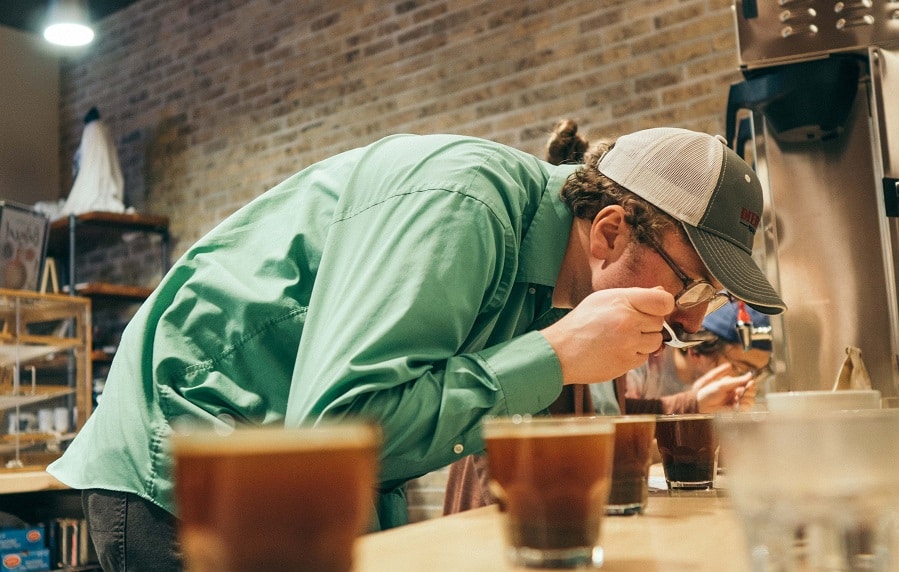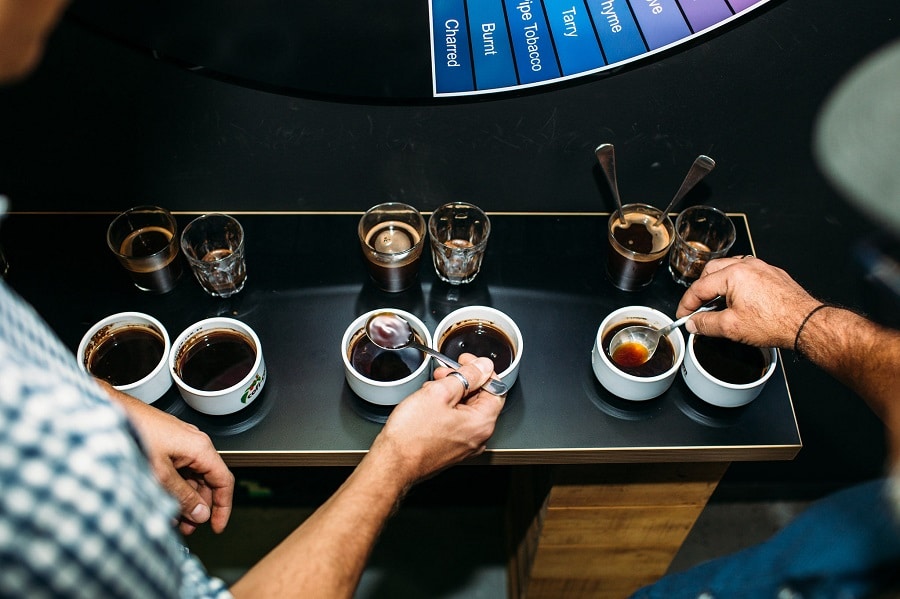Embark on a flavorful journey with us. Learn about coffee's unique taste, the factors that influence its flavor, and how to describe it, whether you're a novice or a seasoned coffee enthusiast. Dive into the captivating world of coffee flavors, from bean varieties to brewing techniques, and enhance your coffee experience.
Coffee has a rich, bold taste and distinct flavor. It's slightly bitter and has a slightly acidic aftertaste, and some may have floral and fruity undertones depending on the type of beans and the brewing method used. People can describe coffee as earthly, nutty, or chocolatey, depending on how it has been brewed. Nonetheless, coffee tastes vary depending on personal preference and the roast.
How to Describe Coffee Taste?

Describing the taste of coffee can be challenging. Using your taste buds, nose, and touch senses, you can explain the flavor, aroma, and aftertaste of a single sip of coffee. Below are some steps to describing the taste of coffee;
- To determine the acidity of the coffee, do it by its aftertaste. A sharp, crispy, with some pleasant taste reflects higher acidity, while a dull aftertaste indicates low acidity.
- Your nose can smell any scent, whether dull or strong. Inhale the aroma of the coffee before taking a sip for better results.
- Your taste buds can tell if the flavor is chocolatey, nutty, or mildly flavored. Which is your favorite?
After all these, you can further describe the taste of Coffee as follows;
- Earthy: A strong smoky flavor has an earthy taste. Like you’re drinking something straight from the ground.
- Nutty: Sometimes, coffee tastes nutty, like almonds or cashew nuts.
- Chocolatey: I love chocolates! A chocolate taste is typical among us since it is included in most ingredients; thus, self-explanatory.
What are Coffee Brewing Methods?
Drip Coffee
Drip coffee is the most common and easiest brewing method. Put fresh ground beans and warm water in a jar with a filter. Let it stir for five minutes or less; then, press the plunger to extract all the liquid into your mug and enjoy.
Cold Brew
As the name suggests, only cold water is used in cold brewing, bringing out a distinct flavor. Coarsely steep ground beans in cold water for about 12 hours, then allow them to rest at room temperature. Using a cloth, strain out the beans and enjoy.
Much better, use an immersion blender for about 30 seconds after straining them for a smoother texture in the subsequent steps.
What are the Undertones of Coffee?

Undertones are the subtle flavors in coffee. They're usually less intense than the main flavor of your coffee, but they add complexity to it. They include;
- Sweetness: Most undertones are sweet because most people prefer sugary things such as caramel and chocolate flavors. Roasted coffee beans are rich in sugars when heated; hence, they taste sweet.
- Acidity: Acidic flavors can be extracted from sour fruits like limes and lemons.
- Fruity: Different types of fruits can be used when making coffee beans to achieve different flavors. Each with different notes.
Why Does My Coffee Taste Like Water?
Are you not enjoying your coffee because it tastes watery? Worry less because we shall tell you the possible reasons and how to fix them;
- Low caffeine: Some types of coffee have low caffeine content compared to others, thus making a watery coffee concentrate. To avoid that, use less water with a large portion of coffee.
- Grind size: Different coffee brewing methods require different grounds. For instance, using coarse ground when making espresso will leave you with a watery taste.
- Wrong coffee-to-water ratio: Ensure to use the right portion of coffee to water. 10g of coffee can make a nice 1 cup of it. However, this depends on the type of coffee.
- Brewing time: Do you want to make a great cup? Allow your coffee to brew well before taking it.
Why Does My Coffee Taste Awful?

Your favorite coffee can sometimes taste or smell awful. But what’s the reason for that? Here are some possible reasons;
The bean
This is an essential ingredient for making coffee, but your favorite bean can be the reason for bad coffee. It is necessary to understand that coffee beans don't have infinite life; they can go bad if not stored properly. Always keep coffee beans in a cool, dry place to maintain their desired flavor and smell. Also, do not store them for a very long time.
During the roasting process, coffee beans produce a lot of carbon dioxide. They will lose taste if they let off a large amount of gas. Additionally, roast the beans well to avoid over-roasting or under-roasting.
The Water
Use clean water to brew coffee. Too hot water can destroy the volatile oils and flavor in the coffee, while cold water will not extract the coffee properly.
To achieve the right temperature, bring water to a boil and allow it to rest for 30 minutes to release some heat. 96 degrees Celsius is a commendable temperature.
The equipment
A dirty coffee maker can contribute to the bad taste of coffee. But I frequently wash my coffee jar and the filter! Yes, but that's not enough. Here are some steps in cleaning your coffee maker properly.
- Use a damp cloth to wipe the inside part of the chamber to remove any particles available.
- Fill the jar with a mixture of water and vinegar in a ratio of 1:1.
- Insert a filter into the jar to filter out any remaining dirt.
- Brew the mixture and let it soak for some minutes before brewing again.
- Change the filter, refill the jar again, and then release the water.
- Use hot water with some dish wash to scrub it thoroughly and rinse.
Doing this will prevent particles from accumulating in your coffee maker, which can ultimately result in a foul odor.
How to Find the Right Coffee for You?
There's always some coffee for everyone. To find the proper coffee for yourself, try out different types in small portions of roasts and blends. You can add it to your favorite creams and milk.
How to Make High-Quality Coffee?
High-quality coffee feels smooth when you drink it. The flavor should be well balanced between sweetness, bitterness, and acidity. Some of the factors that determine the quality and variations of coffee tastes include;
The quality of coffee beans
Different beans have their distinct flavor and aroma, thus impacting the quality of coffee. For instance, Arabica beans tend to be smoother and less acidic, while Robusta beans are large with a strong flavor. The origin of the seed is also a determinant of the quality. This means; where the seed was planted and general maintenance practices like drying well and storing in a cool, dry place.
Fresh coffee beans should be kept in an airtight tin. Well-stored fresh beans can last up to two months before going bad.
Brewing system
A good brewing system ensures high-quality coffee. Some people prefer drip coffee to French press or espresso-made coffee. Either way, choose what works best for you.
Roasting
Roasting is the primary determinant of the coffee product's good or bad. Roasting makes the coffee beans bring out their natural flavor and aroma, which depends on the extent and intensity of the roast. Longer roasted beans are darker with a rich flavor. There are three significant ways of roasting;
- Light roast: A light roast exhibits the original flavor. That means where it was grown and the variety, including the weather conditions. Light roasted beans are light brown with a mild flavor.
- Medium roast: The beans are medium brown with a well-balanced flavor.
- Dark roast: In a dark roast, you cannot distinguish the bean's origin due to its intense flavor and dark brown or black color.
You should try different roasts until you find one that suits your palate!
How Can I Know Whether My Coffee is Well Roasted?

For coffee to taste well, it has to roast well. But, how can I know whether mine is well roast?
A chemical test, the Maillard reaction, determines the degree of roast. At a first crack (around 200 degrees Celsius), it makes a pop sound due to the reaction between amino acids and natural sugars, which makes the food brown.
Under-roasted beans are not heated to the first crack. Therefore, the natural fructose is still high and thus less sweet than well-caramelized coffee. With over-roasted beans, the reaction is hurried up due to too high heat and, therefore, will not properly caramelize due to high sugars.
Conclusion
Coffee has a distinct flavor and smell! It has no perfect taste. But still, it can be either sweet or bitter; all these depend on different factors and a person's preference. You either enjoy it or not. If you have never enjoyed your coffee, try adjusting as we've learned above, it might help. Good luck!